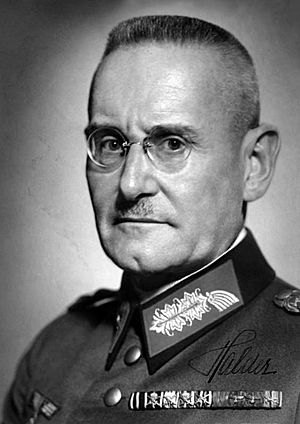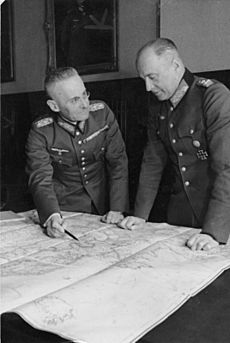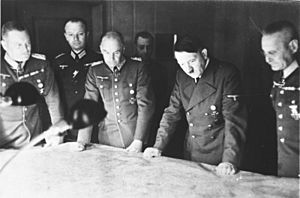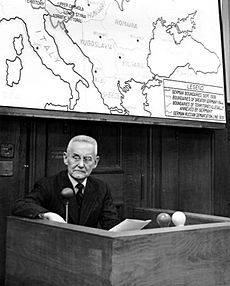Franz Halder facts for kids
Quick facts for kids
Franz Halder
|
|
|---|---|

Halder in 1938
|
|
| Chief of the General Staff of the German Army High Command |
|
| In office 1 September 1938 – 24 September 1942 |
|
| Leader | Adolf Hitler Walther von Brauchitsch as Supreme Commander of the Army (until 19 December 1941) |
| Preceded by | Ludwig Beck |
| Succeeded by | Kurt Zeitzler |
| Personal details | |
| Born | 30 June 1884 Würzburg, Kingdom of Bavaria, German Empire |
| Died | 2 April 1972 (aged 87) Aschau im Chiemgau, Bavaria, West Germany |
| Spouse |
Gertrud Erl
(m. 1907) |
| Signature |  |
| Military service | |
| Allegiance | |
| Branch/service | German Army |
| Years of service | 1902–1942 |
| Rank | |
| Battles/wars | World War I
|
| Awards | Knight's Cross of the Iron Cross |
Franz Halder (born June 30, 1884 – died April 2, 1972) was a German general. He served as the top military planner for the German Army High Command (OKH) from 1938 to 1942. During World War II, he helped plan and carry out the 1941 invasion of the Soviet Union, known as Operation Barbarossa.
Halder played a key role in making the war on the Eastern Front very harsh. He helped create orders like the Commissar Order and the Barbarossa Decree. These orders allowed German soldiers to treat Soviet citizens and prisoners very cruelly without punishment. This led to many terrible actions during the war. After the war, Halder was important in creating a false idea that the German army fought a "clean war."
Halder started his military career in 1914. He met Adolf Hitler in 1937 and became a supporter. He helped plan the 1939 German invasion of Poland. These plans allowed the SS to carry out security tasks, including arresting or executing Polish people. In July 1940, he began planning the invasion of the Soviet Union. Halder was removed from his command in September 1942 after disagreements with Hitler. He was later arrested after a plot to kill Hitler in 1944. Halder kept detailed notes during his time as chief of staff, which were later published as The Halder Diaries.
After World War II, Halder worked as a main advisor for the US Army Historical Division. He oversaw many former German officers who wrote historical documents. He told them to remove anything that made the German armed forces look bad. Halder used his power to spread a false history of the war. This history claimed the German army fought a "noble war" and denied its terrible actions. The US Army allowed this because Halder's group gave them military information about the Soviet Union. This information was seen as important during the Cold War. Halder succeeded in making the German Army seem innocent to the US military, politicians, and the public. In 1961, he received an award from an American president. This praise was very different from the reality of his military career and the harsh events on the Eastern Front.
Early Life and Military Career
Halder was born in Würzburg, Germany. His father was also a military officer. In 1902, Franz Halder joined an artillery regiment. This unit was under his father's command.
He studied at the Bavarian War Academy. He finished his studies in 1914. During World War I, he worked in various staff roles. He received the Iron Cross 1st Class award. In 1919, he joined the Reichswehr. There, he continued in staff and training positions. He even worked under Walther von Brauchitsch. In 1931, he became chief of staff for a military district. He was promoted to generalmajor (general-major) in 1934. After that, Halder commanded the 7th Infantry Division in Munich.
Serving in the Wehrmacht
In August 1936, Halder was promoted again. He became a generalleutnant (lieutenant-general). He then led the Manoeuvres Staff of the Wehrmacht. From October 1937 to February 1938, Halder directed the Training Branch. This was part of the Army's General Staff in Berlin.
During military exercises in 1937, Halder met Adolf Hitler. He became a strong supporter of Hitler. This personal connection helped him rise quickly through the ranks.
On September 1, 1938, Halder became the chief of the General Staff. This was for the Army High Command. He took over from General Ludwig Beck. Beck had resigned because of the Sudetenland crisis. Some officers wanted Halder to lead a plan to remove Hitler. Halder refused this idea. He did talk to a US diplomat, Raymond Geist. Halder said the Army worried Hitler might start a war. However, the Munich Agreement prevented war at that time.
World War II
Invasions of Poland and Western Europe

Halder helped plan the Invasion of Poland. His plans allowed the SS to carry out security tasks. These tasks included arresting or executing Polish people. On September 1, 1939, Germany attacked Poland. This led France and the British Empire to declare war.
On September 19, Halder wrote in his diary. He noted that the SS was starting to "clean house" in Poland. This meant targeting Jews, educated people, Catholic priests, and nobles. Halder knew about these terrible actions. But he did not stop them. He saw them as minor problems. He refused a general's request to go after the SS members responsible.
In late 1939, Halder oversaw plans to invade France and other countries. He and Walther von Brauchitsch thought about removing Hitler. They feared the invasion would fail. But they decided against it. Halder later said Hitler was a great leader. He believed one should not rebel when facing an enemy. Halder's thoughts of resistance were more about power struggles. They were not about disagreeing with the regime's harsh policies.
General Erich von Manstein's plan to invade France through the Ardennes Forest worked. This led to the fall of France. On July 19, 1940, Halder was promoted. He became a generaloberst (colonel-general). He also started receiving secret monthly payments from Hitler. These payments effectively doubled his already large salary. They helped ensure his loyalty to Hitler.
Invasion of the Soviet Union
On March 30, 1941, Halder attended a meeting. Hitler described the planned invasion of the Soviet Union to about 200 officers. Halder later wrote in his diary about Hitler's words. Hitler said soldiers should not see Communists as comrades. He called it a "war of extermination." He told commanders to ignore their personal feelings.
Halder was key in preparing for harsh actions during the invasion. He had his staff draft the Commissar Order and the Barbarossa Decree. These orders were created without Hitler's direct instruction. The Commissar Order demanded that political officers be killed immediately if captured. Halder also added a part to the Barbarossa Decree. This part gave officers the right to destroy villages and kill residents. The decree protected soldiers from being punished for terrible actions in the East. It allowed Soviet citizens to be killed at any time for any reason. Before this, only the SS could kill citizens without fear of punishment. These orders allowed officers to kill citizens without consequences.
The attack began on June 22, 1941. German forces initially met little resistance. Halder confidently wrote in his diary on July 3 that the war was already won. This confidence was shared at Hitler's headquarters in July. However, Halder's confidence quickly faded. New information arrived in early August. He wrote on August 11 that he had underestimated the "Russian colossus." He had thought the enemy had 200 divisions. Now, 360 had been counted. He noted, "We destroy a dozen of them, then the Russians put another dozen in their place."
By mid-August, the German advance had stopped. Long-term defense was also impossible so far from friendly territory. Halder wrote that "Everything that has so far been achieved is for nothing." That summer, Hitler and Halder argued a lot about strategy. By mid-September, it was clear that Operation Barbarossa had failed. It did not quickly defeat the Soviet Union.
Operation Typhoon
Operation Typhoon was the German attack on Moscow. It began on October 2, 1941. German forces surrounded most of the Soviet armies defending Moscow. This happened in the Vyazma and Bryansk pocket. Halder planned the strategy for Typhoon, and Hitler approved it.
Typhoon had a major problem, similar to Barbarossa. Officers on the front lines could not change Halder's goals. This was true even when the goals were impossible. By this time, many Soviet civilians and prisoners were being killed daily. These killings were very unusual for modern times. They made the defense of Moscow even more determined.
On December 5, Operation Typhoon ended. Halder wrote in his diary that they had no more strength. He thought a retreat might be needed. The Soviet army then forced the German retreat. This crisis led Hitler to take command of the OKH himself. He removed von Brauchitsch.
Halder strongly pushed for a quick attack on Moscow. He believed taking the capital would win the war. However, he did not understand that a "lightning war" was impossible in the huge Soviet Union. Even if Moscow had fallen, the war would have continued.
Historians say the Soviet Union was a very strong military power. It was hurt by Germany's 1941 campaign. But there is no proof it was about to collapse. Halder, Hitler, and Fedor von Bock were responsible for the failure. The war in the Soviet Union and the winter that followed were terrible for the German army. Over one million soldiers were lost.
Case Blue
In spring 1942, Halder and the German high command planned a new attack. This was despite the heavy losses in 1941. The plan was called "Case Blue." It aimed to attack the southern part of the front. The goal was to capture Soviet oil fields in the Caucasus. Hitler issued the order for this attack on April 5, 1942. It involved a series of complex operations.
The attack began on June 28, 1942. At first, it seemed successful. Friedrich Paulus easily broke through defenses. Bock wrote that the enemy had not set up new defenses anywhere. However, the Soviet army used a new strategy. It was called "elastic defence." This was very different from earlier battles. It meant the German army often found the enemy had already left.
Confusion followed, and the campaign failed. Bock was removed as Commander of Army Group B. Maximillian von Weichs replaced him. Halder's influence decreased. The relationship between Hitler and Halder became tense. Halder's diary entries became more sarcastic. Hitler mocked him. On September 24, Hitler replaced Halder as Chief of Staff of the OKH. Kurt Zeitzler took his place. Halder was then retired from active duty.
Imprisonment
On July 23, 1944, there was a failed attempt to kill Hitler. This was known as the 20 July assassination attempt. After this, the Gestapo arrested Halder. He was not involved in the 20 July plot. But questioning of other plotters showed Halder had been part of earlier plans against Hitler.
Halder was imprisoned at Flossenbürg and Dachau concentration camps. His wife, Gertrud, chose to go with him. She was allowed to. He did not complain about his living conditions. He was not treated badly. He was held with other important prisoners. These included former French leader Leon Blum. On January 31, 1945, Halder was officially dismissed from the army. In late April 1945, he was moved to the South Tyrol. There, US troops freed him.
Antisemitism
Before the invasion of the Soviet Union, three million soldiers received a key order. It was called "Guidelines for the Conduct of the Troops in Russia." Halder helped decide the words for this order. It called Bolshevism the "mortal enemy of the National Socialist German people." It told German forces to "crack down hard" and "eliminate all resistance." Jews were mentioned in the order. They were meant to be part of this "elimination."
In April 1941, Halder wrote an order for the security police. This was for Operation Marita. The order defined the enemy as saboteurs, terrorists, communists, and Jews. The "criminal orders" Halder helped create show his support for Hitler's harsh policies. Commanders under Halder, like Erich Hoepner and Erich von Manstein, also gave harsh speeches and orders.
After the War
The "Clean Wehrmacht" Idea
Halder played a big part in creating the idea of the "clean Wehrmacht". This was a false view of the war between Germany and the Soviet Union. It claimed the German army fought a "noble war." It denied or ignored the terrible actions committed by the German army.
This idea started with a document called the "Generals' Memorandum." It was created in November 1945. It was given to the International Military Tribunal in Nuremberg. Halder helped write it. Other high-ranking military figures also contributed. The document aimed to show the German armed forces as not involved in politics. It also claimed they were mostly innocent of the crimes committed by the Nazi regime. This strategy was later used by the lawyers defending German commanders in trials.
The document was written at the suggestion of American General William J. Donovan. Donovan later founded the CIA. He saw the Soviet Union as a threat. He believed America should make Germany an ally against the Soviet Union in the growing Cold War.
As the Cold War grew, military information from the German section of the US Army Historical Division became very important to the Americans. Halder led this German section, known as the "Halder Group." His group produced over 2,500 historical papers. These were written by more than 700 former German officers. Halder used the group to rewrite war history. He used truth, half-truth, and lies. He set up a "control group" of trusted former Nazi officers. They checked all the papers. They made authors change content if needed. Halder's assistant in the group was Adolf Heusinger. Heusinger also worked for a US military intelligence group in Germany.
Halder wanted to be called "General" by the writers. He acted like their commander. His goal was to make German army personnel seem innocent of the terrible actions they had committed.
Halder set rules for how history should be written. This version said the army was a victim of Hitler. It claimed they opposed him often. Writers had to stress the "decent" way the army fought. They had to blame the SS for criminal actions. Halder had a special position. Few historians in the 1950s could get historical information without him. His influence reached newspaper editors and authors.
Halder's instructions were clear. They said German actions, from a German viewpoint, should be recorded. This would be a memorial to their troops. No criticism of leaders' orders was allowed. No one was to be blamed. Instead, the achievements of the Wehrmacht were to be highlighted. Historians have noted that the writing of German history on World War II was heavily influenced by Halder's group for decades.
Halder tried to distance himself and the German army from Hitler and terrible actions. He claimed he was against the invasion of Russia. He said he warned Hitler against his "adventure" in the East. He left out any mention of the Barbarossa Decree, which he helped create. He also did not mention the Commissar Order, which he supported. Halder even claimed the invasion of the Soviet Union was a defensive move.
The Americans knew the papers contained many excuses. But they also had information that Americans thought was important. This was in case of a war between the US and the Soviet Union. Halder taught former Nazi officers how to hide bad evidence. Many officers he taught, like Heinz Guderian, wrote popular books. These books spread the idea of the "clean Wehrmacht." Halder succeeded in making the German officer corps seem good again. First with the US military, then with politicians, and finally with millions of Americans.
In 1949, Halder wrote Hitler als Feldherr. It was translated as Hitler as Commander in 1950. This book contained the main ideas behind the "clean Wehrmacht" myth. These ideas were later repeated in many history books. The book described an ideal commander. This commander was noble, wise, and against the war in the East. He was free of any guilt. Hitler alone was responsible for the evil committed. His bad behavior was contrasted with the good behavior of the commander.
Halder's myth-making was not just about clearing himself and the German army. He also created two military myths. The first was that Hitler alone was responsible for military mistakes in the Soviet Union. The second myth was that the quick attack he wanted would have captured Moscow. He claimed this would have won the war for Germany. Historians say Halder shows the big difference between the myth and reality after World War II.
Retirement
Halder's work with the Historical Commission ended in the late 1950s. He received praise from The Pentagon. In 1961, he received the Meritorious Civilian Service Award. This award was given by Major General Edgar C. Doleman. It was on behalf of President John F. Kennedy. Halder became the only German to receive awards from both Adolf Hitler and an American president. (He had received the Knight's Cross of the Iron Cross from Hitler in 1939.)
In the 1960s, Halder became a "historical icon." He answered questions from historians and the public. Halder died in 1972 in Aschau im Chiemgau, Bavaria. The praise he received was very different from the reality of his military career. This was especially true for the terrible events on the Eastern Front.
Awards
- Iron Cross (1914) 1st Class
- Knight's Cross of the Iron Cross on October 27, 1939, as General of the Artillery and Chief of General Staff of the German Army
- US Meritorious Civilian Service Award (1961)
Images for kids
See also
 In Spanish: Franz Halder para niños
In Spanish: Franz Halder para niños
 | Georgia Louise Harris Brown |
 | Julian Abele |
 | Norma Merrick Sklarek |
 | William Sidney Pittman |






